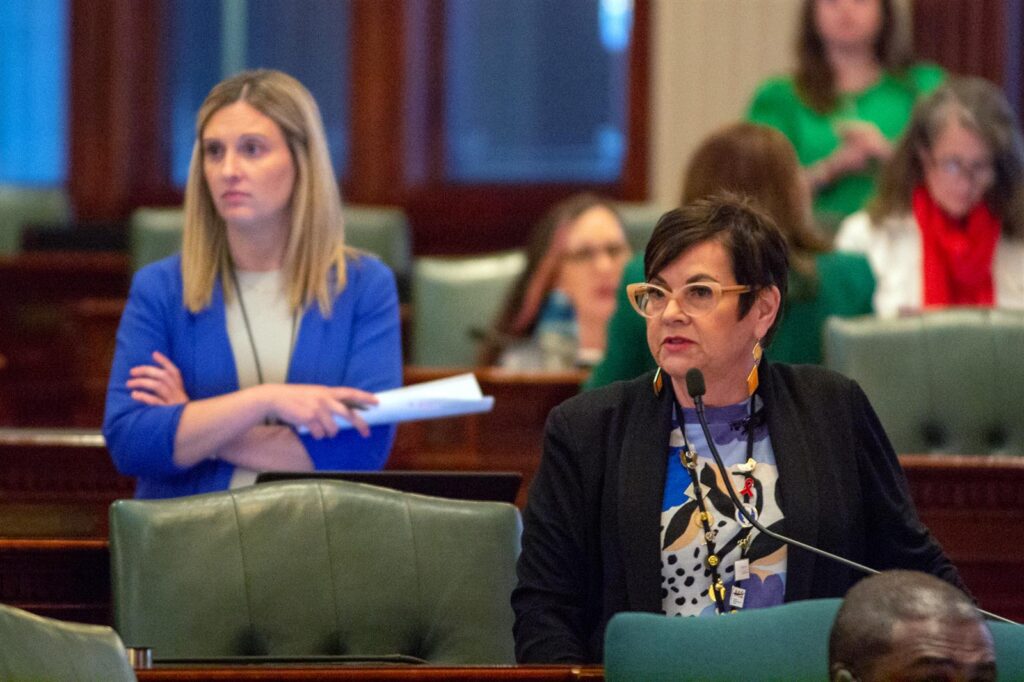State health care committee continues to press pharmaceutical middlemen

By DILPREET RAJU
Capitol News Illinois
[email protected]
State legislators resumed a series of hearings this week to scrutinize pharmacy benefit managers – a highly concentrated industry that critics say drives up the cost and limits availability of prescription drugs.
PBMs, which have also faced scrutiny from the federal government, act as third-party “middlemen” who negotiate which drugs health insurance companies and pharmacies can purchase. By creating formularies, or catalogs of the specific drugs a given employer insurance plan must cover, PBMs can ultimately dictate what drugs are available to patients and pharmacies alike.
In Illinois, Rep. Natalie Manley, D-Joliet, who chairs the House Health Care Availability and Access Committee, said she hoped the hearings presented a chance for the legislature to learn more from PBM executives – though only lobbyists from the trade association representing major PBMs have spoken before the committee.
Two weeks before the state committee met for its most recent hearing, the Federal Trade Commission released an interim report detailing the agency’s findings in an ongoing antitrust probe of PBMs.
The report solidified what people across Illinois’ health care industry have told the committee: corporate consolidation of PBMs results in fewer pharmacies that can afford to stay open and fewer options for patients in need of medication.
It found that PBMs are a highly concentrated market, with the top six PBMs processing 94 percent of the country’s drugs dispensed by U.S. pharmacies.
A joint statement led by FTC Chair Lina Khan said increased concentration and vertical integration “have given PBMs significant power over prescription drug access and prices.”
Manley said her constituents have been affected by pharmacy closures.
“Independent pharmacies have borne the brunt of this, because people in my own town – in Joliet – have been moved to the big box or mail order,” she said. “Pharmacies that they’re used to dealing with are no longer able to compete.”
Read more: Public officials seek greater oversight of prescription drug middlemen
The report indicated PBMs have engaged in “delay tactics” over the past two years in failing to give the FTC the records it ordered them to provide. CNBC and the Wall Street Journal have reported that the Federal Trade Commission is preparing to sue PBMs to obtain the documents the agency requested over two years ago as part of the antitrust probe.
Antonio Ciaccia, an advocate for restructuring prescription drug pricing, told the Illinois committee on Tuesday that the best interests of PBMs relate to money, not consumer health.
“PBMs are not inherently rotten, and vertical integration is not inherently rotten,” Ciaccia said. “But it creates inherent conflicts of interest that work against the interests of the end payer.”
Chad Worz, executive director of the American Society of Consultant Pharmacists, said PBMs have used their position as middlemen to exploit pricing while selling the same drug to various buyers.
“Just like every other layer of the drug supply chain, they are in the business of making more money today than they made yesterday,” Worz said.
The FTC report found “evidence indicating that PBMs are overcharging for two case study cancer drugs (generic Gleevec and Zytiga) and reimbursing their affiliated pharmacies at significantly higher rates than unaffiliated pharmacies for these same drugs.”
It also found that the four PBMs that are part of health care conglomerates (CVS Health Corporation, The Cigna Group, UnitedHealth Group and Humana) have more than doubled their collective revenue in the past decade.
“Today, their combined revenue exceeds $1 trillion and equals 22 percent of national health expenditures,” the report found. “In 2016, the combined revenue of these four conglomerates totaled $456 billion and equaled 14 percent of national health expenditures.”
Rep. William Hauter, R-Morton, who is an anesthesiologist, told the committee the hearings have educated him about complexities within the health care industry.
“There’s so much unfairness in this market,” Hauter said. “There’s just so many inequities.”
Connor Rose, a lobbyist for the Pharmaceutical Care Management Association, a trade association representing various PBMs, pushed back against the idea that top PBMs possess too much power over the industry.
“This is a competitive environment, there is a lid for every pot,” Rose told the committee. “If one PBM is not going to do something for an employer or a union or the state of Illinois, there’s another PBM that will fill its place.”
He said the FTC should complete a more thorough analysis of PBMs, though in its report, the FTC noted PBMs have not been compliant with its probe.
Capitol News Illinois is a nonprofit, nonpartisan news service covering state government. It is distributed to hundreds of newspapers, radio and TV stations statewide. It is funded primarily by the Illinois Press Foundation and the Robert R. McCormick Foundation, along with major contributions from the Illinois Broadcasters Foundation and Southern Illinois Editorial Association.
